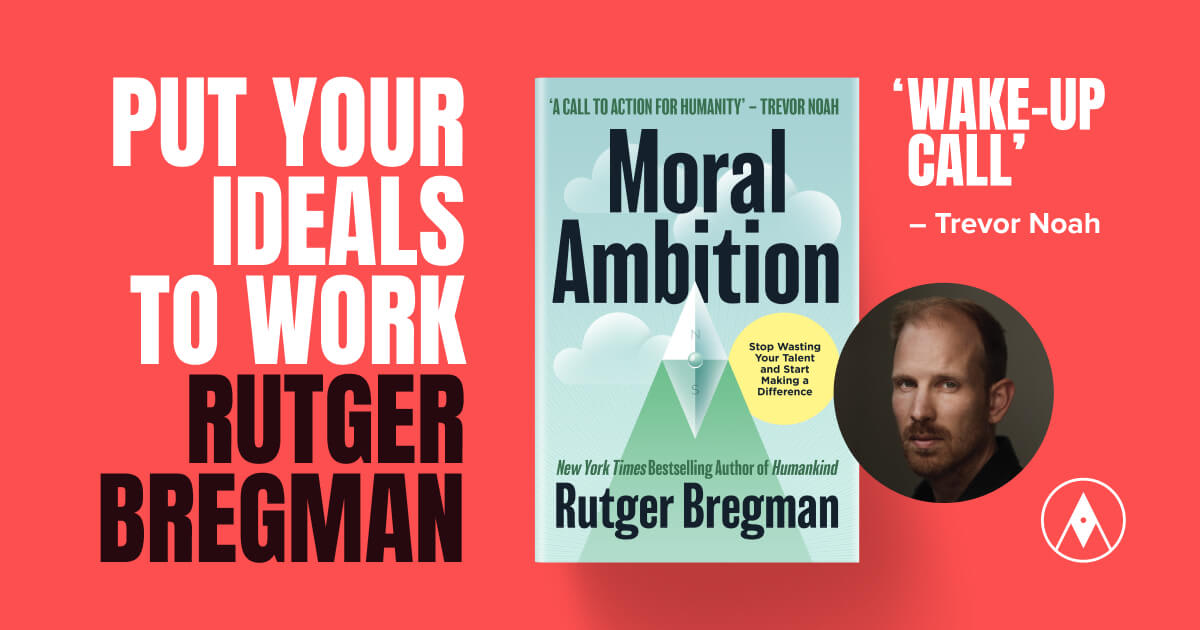Epistemic status: An email thread with a representative for Moral Ambition, consumption of Rutger Bregman's and Moral Ambition's book and social media. A year of leading my local EA group, deep understanding of EA ideas.
Introduction
In early 2025, historian and best-selling author Rutger Bregman published his book Moral Ambition, urging readers to "stop wasting talent and start making a difference." The book serves as a compliment and guide to the movement he's founded [1] called The School for Moral Ambition (SMA). In less than a year, they've grown to more than 9000 members and over 1000 people have completed their Circles Program, which corresponds to an intro fellowship.
Is this just EA with the serial numbers filed off? Or the successor to our stumbling community? To make sense of this new movement and its relationship to EA, I've corresponded with Marijn Scheltens who works as Community Manager at SMA. Her response is summarized here, meant to guide people with an EA background.

Comparison of Principles
To start, we can compare what the two movements consider to be their guides in attempts to do good.
CEA lists four Core EA principles
- Scope Sensitivity
- Impartiality
- Scout Mindset
- Tradeoffs
SMA lists 7 founding principles
- Action
- Impact
- Expansion of moral circles
- Open Mindedness
- Radical Kindness
- Enthusiasm
- Perseverance
To my eye, three of the core EA principles map onto at least one SMA founding principle. The exception is Tradeoffs, which shows a focus in SMA on strong action today as opposed to carefully deliberated and evaluated action proposed in EA. [2] I'd prefer for Collaborative Spirit to also be part of CEA's core principles, and if it were then that'd also map onto SMA's idea of Radical Kindness.
My impression is that part of EA's pitch has been that you don't have to do radical things to do radical amounts of good. 10% of your income is something you can survive without, but others will literally die without that money. Over time we've shifted to be a more demanding community, taking us closer to SMA's explicit ideas of Perseverance and Action.
Similarities
Some chapters in the book Moral Ambition have names like
- "No, you're not fine just the way you are"
- "Learn to weep over spreadsheets"
- "Expand your moral circle"
The world sucks, we should fix it
In our intro talk at EA Lund, we have a slide that looks like this:
SMA agrees, and acknowledges that this simply cannot stand. We don't want the world to be like this, so we should take strong action to fix it. In fact, if I Google "quit your bullshit job," the fourth result is Rutger Bregman's article in The Guardian where he promotes Moral Ambition. What he means is that traditional ideas of prestige should be discarded in favor of considering what's actually valuable for society.
Cause Prioritization
The ITN framework has made it into SMA, but they talk about problems being Sizable, Solvable and Sorely Neglected - an SSS framework. Marijn reported that this has been "incredibly useful for identifying impactful causes." So when deciding which problems to solve, one core tool is shared between EA and SMA.
Cause Areas
In concrete terms, the protein transition has become one of the biggest cause areas within SMA. Another is combating the tobacco industry, which has been talked (a little) about in EA as well. In fact, I personally think that this is one of the key causes where SMAs and EAs can and should collaborate more.
Differences
I'll list these in descending order by how much I agree about them being core differences.
Criticism Culture
EA is about evaluating causes and actions to do the most good. This is part of why we're so focused on receiving/seeking feedback and criticism - we want to improve! Part of the project is questioning if what we're doing is working, how to evaluate that and how to increase cost-effectiveness.
This varies locally, my impression is that it's more common in the Bay Area or Oxford. Scandinavian EAs, for example, are often content doing the 5th most impactul thing they could be doing, celebrating the gains they've made by not just doing some random thing. This is highly anecdotal.
SMA is more similar to the second type of EAs, focusing more on emotional intelligence, inclusivity and showing support for each other's projects. This is the principle of Radical Kindness, and Marijn explicitly contrasts it to EA's "hyper-rationalist, longtermist vibe."
Impact
SMA evaluates impact differently from EA. Since Impact one of their founding principles, I'll let that text speak for itself.
We don’t aim for change alone, but for truly transformative impact. We know we must prioritize, and we choose to focus on the world’s biggest, most neglected, yet fixable problems.
At the same time, we’re wary of the measurability bias because not everything that counts can be counted. In cases that aren’t quantifiable, we do our best to construct a robust theory of change.
While measurability has been discussed, critiqued and celebrated in EA, most EAs would advocate doing things with outcomes you can clearly notice. EAs rarely tolerate their efforts wasted on things with low EV, and prefer being sure that they're achieving the original goal of doing as much good as possible.
SMA is less rigorous. A clear example is Systemic Change, where most EAs have simply deemed it too intractable and/or immeasurable to be relevant. (I did this myself recently when I spoke to a new member of our group who was excited about educational reform in Europe - instead I recommended he check out J-PAL's work on the topic.) SMA considers this an advantage as it frees their hands to focus on things that "might seem less straightforward but are still massively important."
This is the difference I'm most worried about personally. First off, I think the we should focus on less straightforward but potentially important things if they have high EV, which doesn't seem to be the way SMA makes these calls. Secondly, given the landscape of interventions being so heavy-tailed, there's a high risk of failing to have an impact if you're not measuring the effect of your actions.
SMA still uses the ITN framwork (SSS framework) and care about having an impact. Where EA says we should err on the side of quantifying too much, SMA would say we should err on the side of trusting good qualitative arguments.
Motivations
Many had their first experiences in EA be about learning how truly awful and unjust the world is, and then concluding that we should act more strongly based on that. SMA tries to emphasize this aspect less, and more the aspect of how great we can make the world, building enthusiasm and vision.
I don't think this is as big a differences as some (especially SMA) may think. I don't see that many community builders in EA put emphasis on guilt or moral obligations, because they don't need to. Everyone and their grandma already wants to improve the world. If you're a community builder finding this guilt-based outreach to work well, feel free to reach out to me for a chat, I'd love to understand more about it.
I do concede that some parts of the traditional intro fellowship syllabus push this idea. I also observe that EA is more philosophically inclined, so I understand where the impulse to assume EAs are guilt-driven comes from.
Ethics
EA and SMA are both explicitly consequentialist. What matters most is the outcomes of our actions, rather than why we do them or how we do them. However, EA has a bigger focus on utilitarianism - making us discuss things like population ethics or which animals' welfare ranges we should figure out first. This shows most strongly in SMA not being as hype about longtermism, not fazed by the (potentially literally) astronomical amount of people in the future. Instead, they consider things like fairness significantly, for example having a fellowship focused on taxing billionaires.
Personal thoughts
Below are some thoughts I personally have about this new movement and what it means for our movement and the world at large.
Novelty
When I first discussed thoughts on SMA with others in EA, we recognized that novelty can be a strength. I don't think many of the 9000 members of SMA are EAs, which means the world now has more do-gooders! However, if I were strict about impact evaluation, I would argue that they only count as ~90 EAs unless they do their cause prioritisation homework and end up on the fat tail of impact.
Baggage
Being detached from EA is also nice reputationally. It means SMA can take new risks, like being much more political with things like lobbying. If this fails, EA won't be to blame.
Conversely, those who were put off by earlier corrupt EAs like SBF now get a chance to improve the world without associating with EA. Likewise for those who've been put off by rationalist vibes or criticism culture discussed above.
Should you join SMA?
It depends on what you like about EA. When I first found EA, it was the only movement of its kind. Now there's a spiritual sibling.
If you want more philosophy, more prioritization & analysis, more effectiveness & rationalism, more longtermism & x-risk, then I think you should lean further into EA.
If you want more focus on altruism, warmth, "just doing something", pluralism, mainstream ideas, optimism, or novelty, then I think you should join SMA.
Personally, I'll keep building the effective altruism community because it's probably more impactful on the margin, but I'll start hanging around SMA spaces when I get the chance because they seem fun and inspiring. That I was already aiming to work on one of their cause areas (protein transition) is a bonus.
Collaboration
With literal thousands of new people trying to improve the world, if all goes right there should be a lot of new projects popping up to address pressing issues. I expect the coming months to be extraordinarily exciting for anyone doing work adjacent to or in one of SMA's core cause areas, and recommend that you keep your ear to the ground for ways in which you can aid them. This is also a good time for people to go back and check out how to collaborate effectively and consider things like networking with others in mind.

Acknowledgements
- Marijn Scheltens for answering with great honesty and clarity.
- Toby Tremlett from The EA Forum Team, Arthur Zeuner and Bjarke Almer Frederiksen for proof-reading and feedback.
- ^
Bregman has since stepped down from the board to avoid conflict of interest since he's giving away all the proceeds from his book to the movement.
- ^
The 80000 Hours career guide says: “Even if you only improve your impact by 1% as a result of spending 100 hours carefully thinking through your career, that’s equivalent to spending 800 hours on direct work — several months of full-time effort.”


Thanks for your thoughts on this.
I would note that Moral Ambition did mention catastrophic risk, specifically mentioning risks from Artificial General Intelligence, as a potentially promising area for morally ambitious people to make an impact.
Also, work on systemic change is consistent with core EA principles (doing the most good with the resources we can). Some areas could be a strong speculative bet, similar to the reasoning supporting some projects associated with longtermism.
I think there's a very high degree of complementarity and compatibility with core EA philosophy, even if actual SMA conclusions in terms of cause areas differ in some ways from the cause areas EA tends to focus on. I think, however, core EA philosophy is about the fundamental principles, not the downstream cause areas, and if different people's epistemologies proceeding from those principles lead them different places than where the current EA community is, I don't think they are any less EAs.